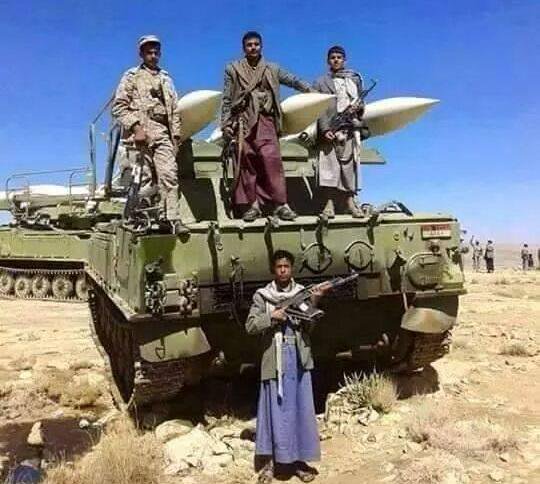As the fate of Yemen hangs in the balance, the military coalition led by Saudi Arabia that supports the government of Yemeni President Abed Rabbo Mansour Hadi is about to escalate its two-year-old war by launching a new offensive in the key Red Sea port of Hodeida. The move aims to throttle Hadi’s enemies, Houthis aligned with former President Ali Abdullah Saleh, but it is more likely to choke the country’s population, tipping it from hunger and starvation into outright famine.
Hodeida, the country’s busiest and most important port, is responsible for 80 percent of northern Yemen’s imports. If the Saudi-led coalition proceeds with an offensive against Houthi and pro-Saleh forces ensconced in the port, it will cut a lifeline sustaining the bulk of Yemen’s population, including in the capital, Sanaa.
The combination of incessant ground fighting and heavy aerial bombardment has eradicated any semblance of a functioning economy in Yemen. Since August 2016, the Central Bank of Yemen has been unable to pay public-sector salaries. President Hadi’s subsequent decision to move the bank from Sanaa to Aden has further fractured Yemen’s banking system. Revenues from oil and gas, approximately half of the national budget before the war, have all but ceased, and the proceeds from what little is produced in government-controlled territories are not being deposited into the Central Bank. All in all, the hunger crisis at the moment is primarily a function of dwindling purchasing power, as the population cannot afford the food that is available in markets.
Worse, though, is yet to come. The already dire situation could degenerate further as the Saudi-led coalition, relying on troops of the United Arab Emirates, appears determined to break a military stalemate that has largely held since September 2015. By attempting to capture Hodeida and the Red Sea coast from the Houthis and pro-Saleh forces, the coalition claims it can stem the flow of weapons via sea routes to its enemies and increase pressure on Houthis to return to the bargaining table—this time on terms more favorable to the Hadi government. It was the government, not the Houthi-Saleh bloc, that walked away from the most recent peace initiative, the plan pushed by then-U.S. Secretary of State John Kerry in August 2016, which even Saudi Arabia and the UAE publicly accepted.
The strategic logic underpinning the planned Hodeida campaign, which the Pentagon is now considering backing militarily, is deeply flawed and dangerous. For one thing, Saudi-led ground forces have had at best mixed success in seizing territory in Yemen. When they have succeeded, it was in areas where Houthi and pro-Saleh forces had fewer interests at stake or had insufficient time to fortify their positions. In Hodeida, they have had ample time to entrench themselves.
Even if a combination of government and UAE ground troops, supported by Saudi airpower and U.S. intelligence and military assistance, succeeds in capturing the port, they are unlikely to be greeted as liberators. The local population may have little love for the Houthis, but they also nurture deep resentment toward Hadi and his foreign backers. The aftermath could be even worse, as tightening; the noose on the Houthis militarily will disproportionately harm civilians.
The U.S. is increasingly implicated in the Yemeni war. Since President Donald Trump took office, his administration has stepped up drone strikes, deployed Special Forces against jihadi strongholds and sharpened anti-Iran rhetoric. An offensive on Hodeida would draw the U.S. further into the war, but without a clear endgame. Indeed, as a recent International Crisis Group report details, a blank check for the prosecutors of war will only perpetuate the current chaos. The main political beneficiaries will continue to be jihadi groups such as al-Qaida in the Arabian Peninsula and local affiliates of the self-proclaimed Islamic State. This will push Yemen closer still to the point of total disintegration, with no prospect of restoring stability.
What should the international community do to prevent the worst? No amount of humanitarian aid can solve the underlying drivers of this crisis. Yemenis are starving because of sieges, the degradation of state financial institutions and a collapsing economy. These are direct consequences of war and, specifically, deliberate actions by combatants.
Both the Saudi-led coalition and Houthis should refrain from further weaponizing the economy by blocking basic imports and humanitarian assistance, while the coalition should cancel plans to take Hodeida.
Instead, all warring parties—the Houthis and pro-Saleh forces, the Hadi government and the Saudi-led coalition—should strike an immediate deal that would allow Central Bank technocrats to resume disbursing vital public-sector salaries and social-welfare cash transfers throughout Yemen, free from political interference. This would be a critical first step in alleviating daily suffering.
Such stopgap measures must be supplemented by a political process leading to a durable cease-fire and peace settlement. The U.N. Security Council members who have hitherto indirectly or directly condoned and even abetted Yemen’s war through their arms sales or direct military assistance should revive the political track by passing a long-overdue resolution demanding an immediate cease-fire and unfettered humanitarian access. Only then might a famine be averted.
World politics review
خليك معنا

